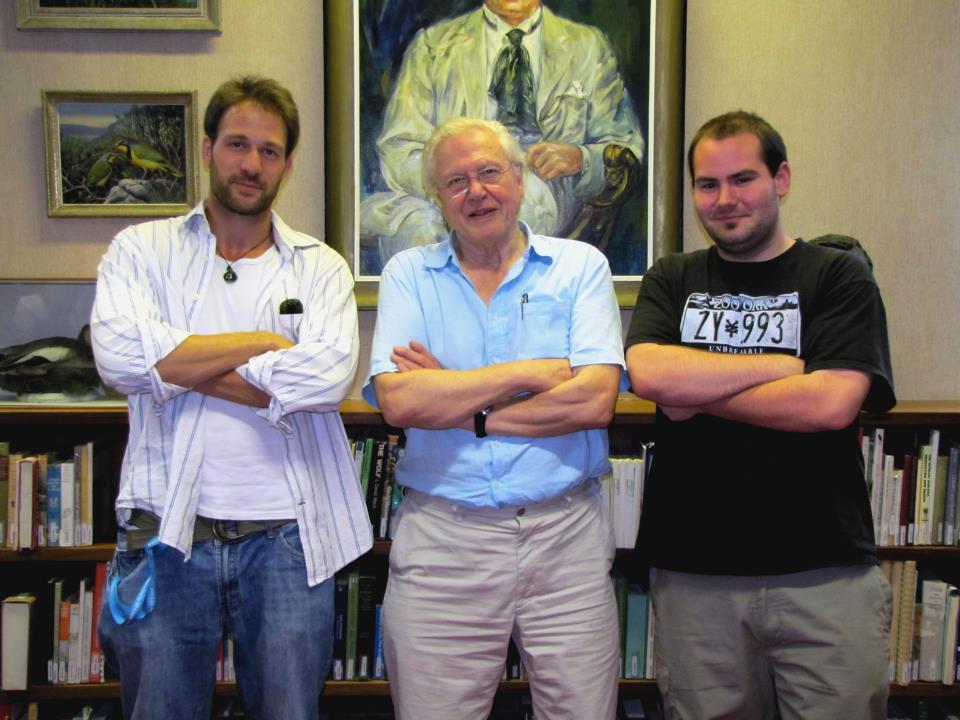His simple blue shirt and chino combo has graced our screen for decades. The melodic tones of his voice and childlike wonder and excitement have relayed the wonders of nature and narrated the epic life stories of untold numbers of species. From plants to insects, mammals to birds, Polar Regions to deserts, and ocean floors to darkest caves, he has helped to illuminate the natural world (IMDb of Big Dave). The most amazing thing is that he seems to be working almost as hard now as he ever has, even abseiling down the new Cambridge Conservation Campus to open it!
Everyone will have differing memories of this towering figure of natural history. Below I tell mine. But here are a few of his “best bits”: LINK
I have been lucky enough to hear the great man speak. He had been at university with the son of Cecily Niven, the woman whose hard work saw the setting up of the Percy FitzPatrick Institute of African Ornithology. They had been good friends and Sir David had agreed many years ago to come and speak at the university. However, over the years of their friendship he had never been able to make it to the Cape to fulfil his promise. He had now made the journey to honour the request made to his now departed university chum. His topic was Birds of Paradise, a subject close to his heart as can be evidenced in his documentary retracing the steps of Wallace to Papua New Guinea. This specious and vibrant group of birds have fascinated naturalist and behaviour biologists for years, with their amazing plumage and courtship displays. His speech was a mesmeric blend of footage, photos and wonderful anecdotes that was topped with a generous sprinkling of natural history. At the end the floor was opened to question, which was a big job as the Baxter Theatre was at full capacity and the crowd were eager to ask questions from a lifetime of viewing the great man on screen. The top question came as a women stood up, unzipped the back of her dress and turned to reveal a full back tattoo of a bird of paradise. She asked ‘what is your favourite species of bird of paradise?’ to which Attenborough replied with a wry smile ‘it would be ungallant of me to say any other then the one on your back.’
I was also fortunate to be able to ask him a question. I had recently seen one of his documentaries where he explained trilobites and the amazing fossils to be found in Morocco. I nervously got up, in front of not just the other PhD students but also most of the Biological Sciences faculty (who had come along even though they weren’t supposed to) and I asked him what his favourite trilobite was. Without really pausing to start his answer and a twinkle in his eye he began to speak, and I was initially saddened. He seemed to either not have heard the question or misunderstood it. My hero, in his dotage was afflicted by senility. However, I couldn’t have been more wrong. With a story telling panache and with witty repartee he spun a long story that went on for almost 10 minutes and culminated in a perfect answer to my question. He was still razor sharp. Afterwards I rushed back to the department with a friend, as we’d heard he was back at the Fitz, and I got a picture with my idol!
I hope that he can go on for many more year, but I realise that 90 is already a great innings. This man is truly one of the greatest modern Britons, whose work exemplifies what the BBC stands for: public service broadcasting. He has pioneered and championed the best natural history film making and in so doing so done a great service to the natural world, which he is so endlessly fascinated by.
He is my hero.


 RSS Feed
RSS Feed
